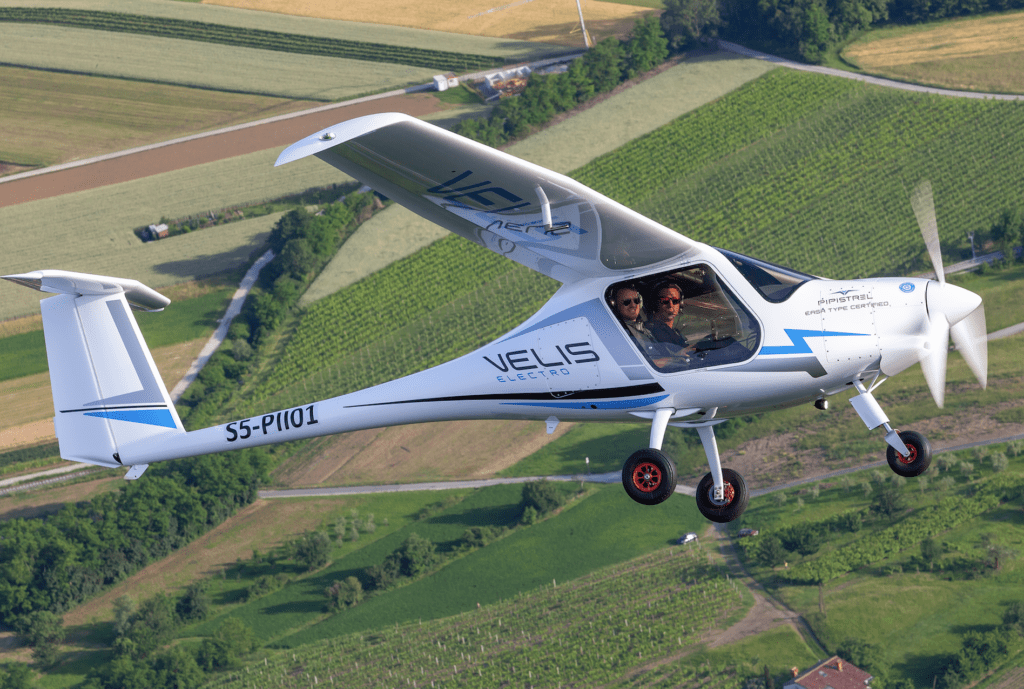
Pipistrel, creator of the Velis Electro aircraft, will be bought by Textron, according to an announcement from Textron last week. (Photo: Pipistrel)
Textron Inc. announced a purchase agreement on March 17 to acquire Pipistrel—developer of the Velis Electro electric aircraft. Once the purchase is finalized, Textron plans to create a new business segment called Textron eAviation, which will include Pipistrel and will focus on sustainable aircraft. Pipistrel’s CEO and founder, Ivo Boscarol, commented, “The joining of Textron and Pipistrel provides deep expertise and resources which would otherwise be inaccessible to Pipistrel alone. With Textron, we are together geared to strive for future growth and look forward to announcing exciting new products and projects.”
Textron expects the transaction to be finalized during Q2 of this year. The company’s long-term strategy to develop sustainable aircraft will be strengthened with the acquisition of Pipistrel and the creation of a dedicated business unit, Textron eAviation. The eAviation division will have its headquarters in Wichita, Kansas, and will incorporate Pipistrel’s expertise in sustainable flight in addition to Textron’s product design, certification, manufacturing, and aftermarket solutions, according to the company.
Chairman and CEO Scott Donnelly noted that Textron’s ultimate goal is to provide vehicles for applications ranging from urban air mobility and general aviation to cargo transportation and special missions. Donnelly also remarked that they intend to maintain Pipistrel’s existing headquarters and manufacturing in Slovenia and Italy in addition to continuing research and development.
Pipistrel’s Velis Electro aircraft received the first type certification for an electric aircraft from the European Aviation Safety Agency (EASA) in June 2020. The vehicle is still the only electric aircraft in the world to achieve EASA type certification. Last year, Pipistrel’s motors, motor controllers, and batteries were selected by the company Airflow for integration into Airflow’s fixed-wing proof-of-concept aircraft. CEO and co-founder Marc Ausman told Avionics in an interview that they chose Pipistrel’s products because the company “had the complete end-to-end system already integrated together [and] have already been tested to work together.”
Developments in aviation have proven to be a critical component of Textron’s recent growth. Textron’s total revenues in 2021 were 6% higher than in 2020, and their aviation segment accounts for 37% of last year’s total revenue. Furthermore, Textron Aviation is projected to grow 21% over the next two years and it is estimated that the Aviation segment will account for 42% of total revenues for 2022.
Just last week, Textron Aviation achieved Federal Aviation Administration (FAA) type certification for the Cessna SkyCourier, a large-utility twin-engine turboprop. According to the company, they are using some of the latest “advancements in aircraft manufacturing, including the use of monolithic machining throughout the airframe” in production of the SkyCourier. The aircraft was launched in 2017, and FedEx entered an agreement to purchase up to 100 units of the cargo variant for its fleet.
Along with Textron’s planned business segment, eAviation, which will be dedicated to sustainable flight, the company’s subsidiary Bell Textron also makes sustainability a strategic priority. Bell Textron is partnering with Safran Helicopter Engines to evaluate sustainable aviation fuel (SAF) and its economic impacts; this partnership was recently announced during the HAI Heli-Expo event in Dallas, Texas. The collaboration between the two companies will include analysis of the technical performance of SAF to fuel Bell’s 505 helicopter, powered by Safran’s Arrius 2R engine.